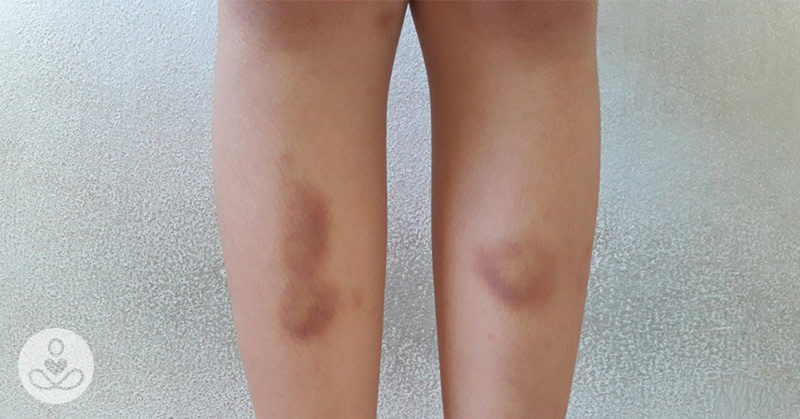The ketogenic diet has been used to treat certain medical conditions for almost 100 years. Lately, however, it’s been experiencing a resurgence as a magic diet.
The keto diet, as it’s commonly referred to, has been used to treat diabetes, cancer, epilepsy, Alzheimer’s disease, and even to help accelerate weight loss. Studies have shown that, on average, people lose 2-3 times more weight on a keto diet than on a low-fat diet [1].
Basically, the ketogenic diet forces your body to use fats for energy (which are broken down into molecules called ketones) instead of carbs (which are broken down into glucose). Many people stick to a 75% fat, 20% protein, and 5% carb regimen, or some variation of this model.
Even people who aren’t trying to treat a disease or lose weight benefit from the ketogenic diet. So why would you need to quit it? Let’s briefly review the ketogenic diet before revealing the ten signs and symptoms that you might have to give it the slip.
The Ketogenic Diet

In case you weren’t already familiar with how the ketogenic diet works, let’s talk. The keto diet works by forcing your body into a state of ketosis. Normally, this would only happen when you were fasting. However, in the 1920s, doctors figured out a way to induce ketosis with a specific diet [2].
By essentially replacing carbs with fat, your body begins burning fat for energy instead of carbs. Why would this be a good thing? The ketogenic diet can help with weight loss, high blood pressure, diabetes, neurological disease, and epilepsy. It’s even been shown to be a potential aid in treating cancer [3] and to help with obesity [4]. The keto diet has a range of benefits for people who commit to doing it correctly.
Of course, as with any other diet, there are downsides to eating mostly fat, the first being that your foods are definitely limited. You’ll need to cut out most of your carbs, which means eating practically no bread, sugar, alcohol, or fruit. In addition, the body will go through an adjustment period which may be difficult, if not impossible, for some people to handle.
And finally, doing the keto diet long-term can also pose challenges due to the food restrictions. However, when used for a specific purpose, it can be beneficial. When should you consider giving up the ketogenic diet? Here are ten signs and symptoms your body is telling you to stop (as well as what you can do to potentially remedy these issues and keep going!)
Read More: Fodmaps Diet: If Chronic Bloating or IBS Is Ruining Your Life, Try This
9 Signs Your Body Is Telling You to Stop
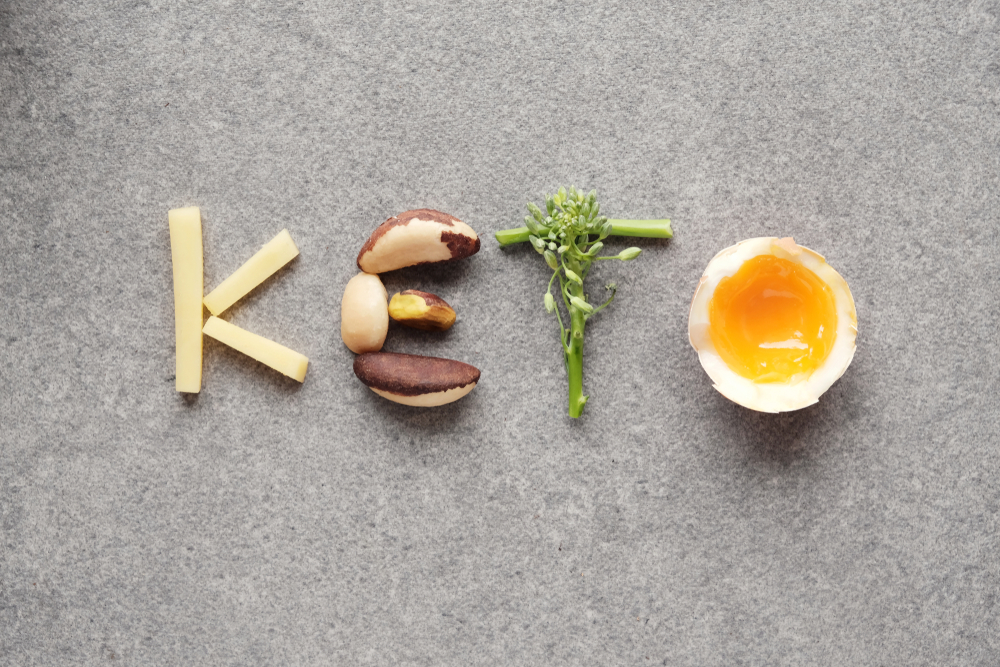
If you’ve been following a ketogenic diet, you’ve likely experienced its touted benefits, from weight loss to improved mental clarity. However, there comes a point when your body might start sending signals that it’s had enough. While the ketogenic diet can be effective for many, it’s not a one-size-fits-all solution, and listening to your body is paramount. Here are ten signs that your body might be telling you to hit the pause button on the keto journey.
1. Fatigue

While transitioning into a state of ketosis (where your body burns fat), your body will probably be confused that you’ve taken away glucose (carbs) as its main source of energy.
As a result of this, you might feel pretty tired in the first few days if not weeks. The adjustment period will be different for everyone—while some doctors say seven to ten days is normal, on other days this fatigue could last up to six weeks!
As a solution to your fatigue, you can try to eat more fats or switch to a moderate-carb diet instead of a low-carb diet to see how you feel. In addition, you may need to limit your workouts during this time or only do light workouts until your body adjusts.
2. Headache

https://www.shutterstock.com/image-photo/crisis-stress-black-woman-problem-office-2328855183
The dreaded “keto headache” could be caused by a few factors. You may be dehydrated and have lost essential electrolytes. While your body is in ketosis, you lose more salt, meaning you may need to up your salt intake.
You may also be in withdrawal from sugar and carbs, especially if these constituted large parts of your diet before. It’s important to be gentle with your body during this time of transition.
It’s also vital to ensure you’re getting all the nutrients you need to stay healthy, so be sure to incorporate lots of water (a pinch of sea salt in your water is a great way to replenish electrolytes, or make your own energy drinks) in addition to eating whole foods, including lots of plant-based foods. How long does the keto headache last? It could only be one day or it could be up to two weeks [6].
3. Anxiety

Experiencing anxiety as a side effect of the ketogenic diet is rare, as the ketogenic diet has actually been said to help anxiety in many cases, although this hasn’t yet been proven. (These unclear results are probably because they used animal testing in conjunction with human testing in the research).
However, if you do end up experiencing anxiety while your body is transitioning into a state of ketosis, it’s essential to limit or avoid caffeine in an effort to not exacerbate symptoms [8]. Remember that caffeine is present in coffee, some teas (such as green, black, and oolong tea), some sodas, chocolate, and, of course, energy drinks.
4. Constipation
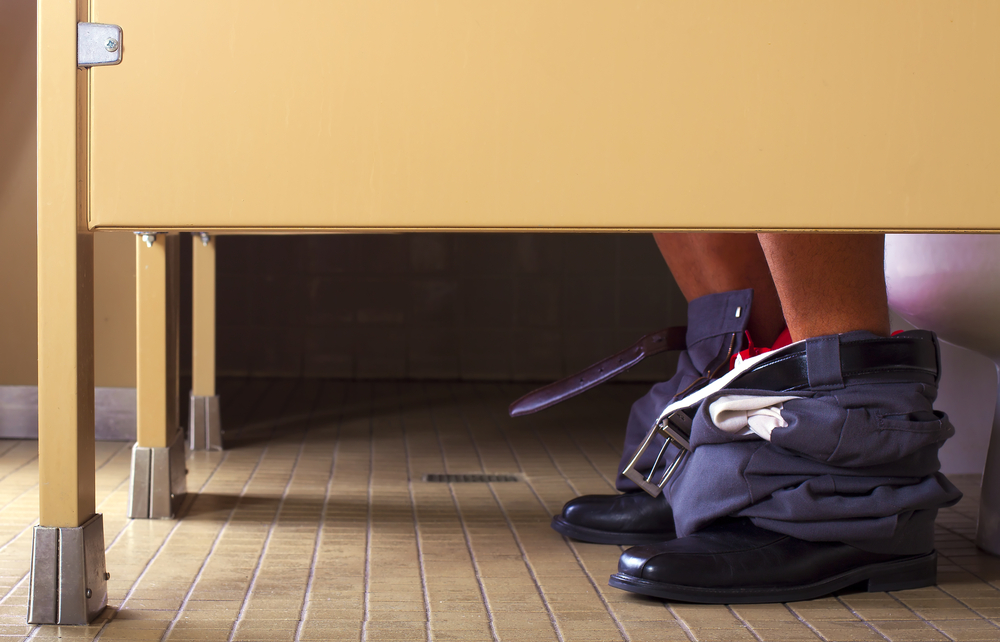
Constipation as a side effect of starting the keto diet isn’t uncommon, as typically people aren’t drinking enough water and may not be getting enough fiber.
If you’re experiencing this side effect, it’s important to include lots of vegetables in your diet. There are plenty of vegetables that are low-carb, including spinach, kale, and asparagus. In addition, you can get more fiber (flaxseed and chia seeds are some good plant sources), take probiotics, and drink more water in addition to exercising to help stop this frustrating symptom.
5. Hunger

https://www.shutterstock.com/image-photo/dont-let-hunger-happen-you-surprised-1857403459
If you’re hungry on the keto diet, you may be doing the diet wrong. The keto diet focuses on animal proteins, yes, but your diet should be mostly plant-based, so get that fiber in!
You’ll also want to avoid processed foods, so processed meats are out. Doing the diet correctly can help to curb your hunger, along with eating the right snacks. You may also be hungry due to lack of sleep, stress, or dehydration, so be sure to address all these issues in addition to ensuring your health on the diet!
Read More: LCHF 101: Complete Beginner’s Guide to a Low-Carb, High-Fat Diet
6. Dehydration

You may be dehydrated on the keto diet, but if you drink lots of water, you also risk flushing electrolytes from your body. You can drink more water, but you should also focus on replenishing your electrolytes, including salt, bone broth, and mineral water.
As a rule of thumb, your urine should consistently be a pale yellow color. Anything darker could signal dehydration!
7. Loss or Disruption of Menstrual Cycle
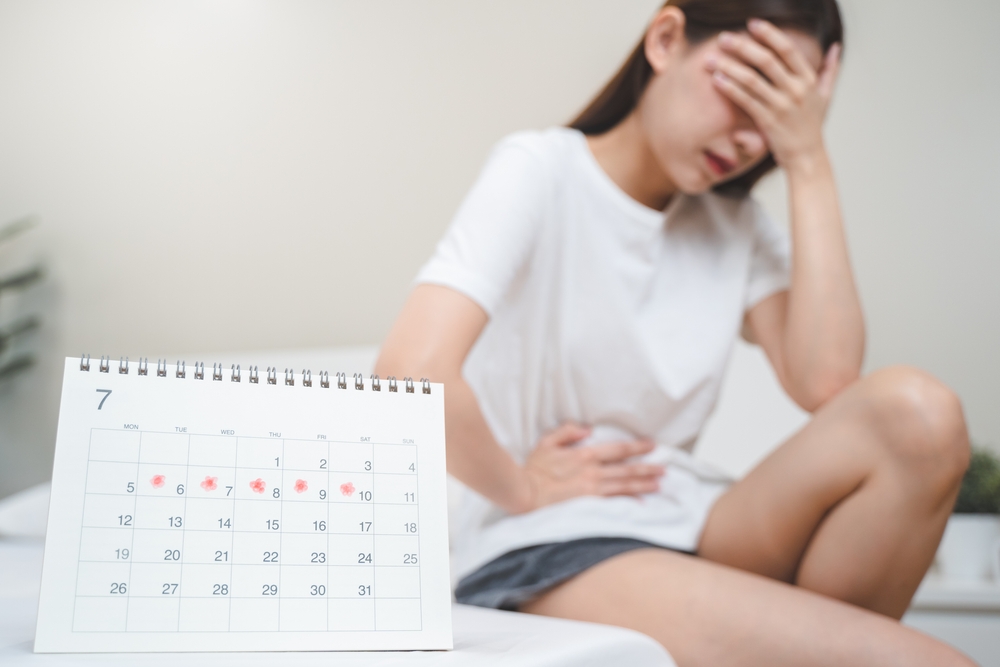
Did you know that a low-carb diet can actually stop your menstrual cycle (for those of you who experience dysmenorrhea, don’t get too excited)? Your menstrual cycle can also be disrupted by not eating enough, losing too much weight too fast, or excessive exercise.
If you’re experiencing problems with your cycle on account of the ketogenic diet, you may consider upping your carb intake. Less than 50 grams of carbs daily over a long period of time has the potential to cause an imbalance of hormones which may impact your cycle [11].
8. Bruising
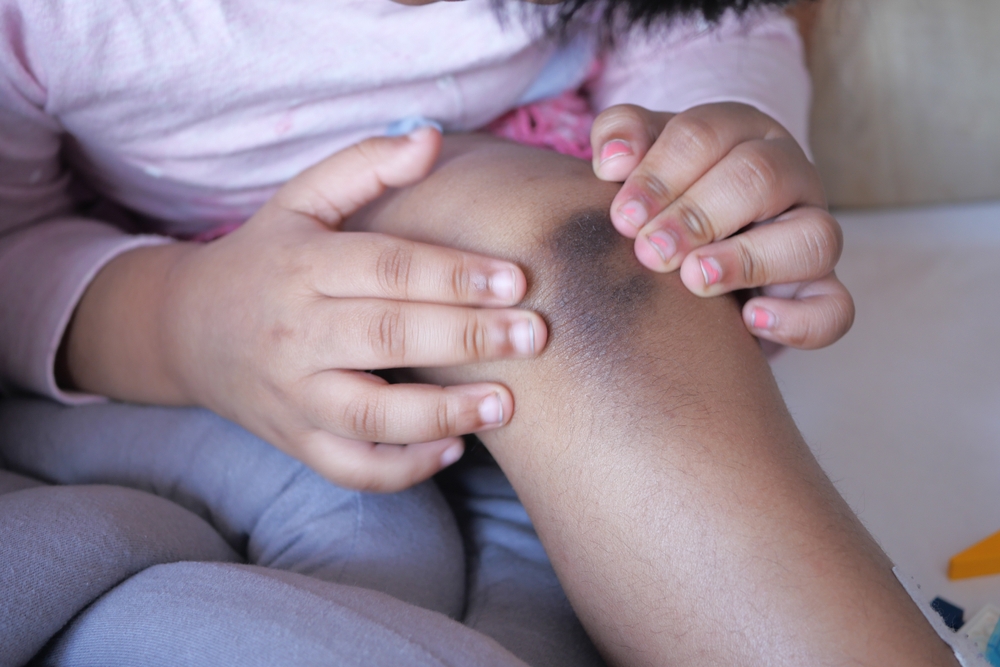
https://www.shutterstock.com/image-photo/stain-bruise-wound-on-child-knee-2372882811
The ketogenic diet has been shown to be effective in children who suffer from epilepsy. However, bruising is a side effect that occurs in one-third of children who are on the keto diet [12]. Experts speculate that this change can happen due to changes in platelet responsiveness while on the ketogenic diet.
While bruising should be evaluated by a physician, this symptom alone may not be a reason to give up the diet, especially if your child is experiencing benefits and relief from their epilepsy.
Read More: 17 Foods High in Magnesium You NEED in Your Diet (see list)
9. Kidney Stones
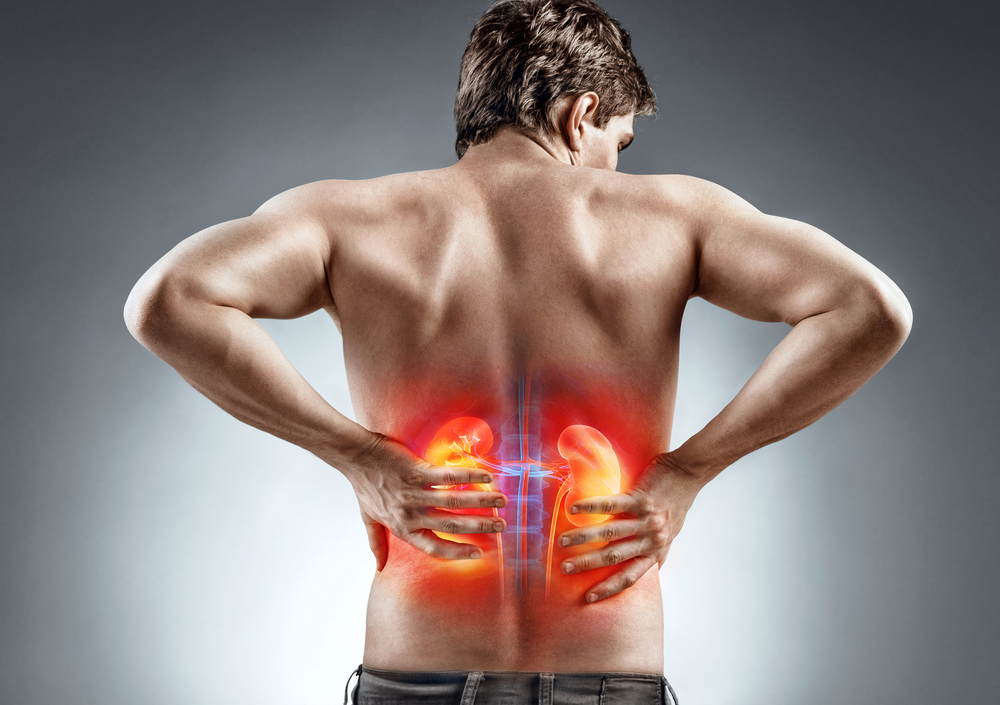
Patients with kidney disease should always consult with their doctor before going on the ketogenic diet [13]. If the keto diet is done correctly, kidney stones are a rare complication, but they are considered a risk [14]. In order to help combat your risk of kidney stones while undertaking the ketogenic diet, you can increase your fluid intake as well as your consumption of alkaline foods, which include cabbage, celery, broccoli, spinach, peppers, zucchini, squash, lettuces, and cucumber.
A Note on “The Keto Flu”

The keto flu is a term that encompasses a range of symptoms people experience at the beginning of the ketogenic diet—these include:
- Extreme fatigue
- Brain fog
- Increased hunger
- Insomnia
- Nausea
- Digestion issues
These symptoms are only supposed to last for a few days, but everyone’s body will respond differently to using ketones for energy instead of glucose. Getting the right nutrients can help decrease these symptoms, including sodium, potassium, and magnesium. If you’re suffering from nausea, eating alkaline foods may be able to help (the foods we discussed above in #9).
The Bottom Line

Before starting any diet, talk to your healthcare professional. It could a doctor, your herbalist, or a nurse practitioner. Regardless, it’s important to know how a diet will affect your body before you start.
The ketogenic diet is great for many people, but it’s not for everyone. If you’re experiencing any of these symptoms, consult with your healthcare professional about potentially stopping the diet, or evaluate what you can do to feel better while still continuing the diet. And remember—always listen to your body and eat well while on the keto diet!
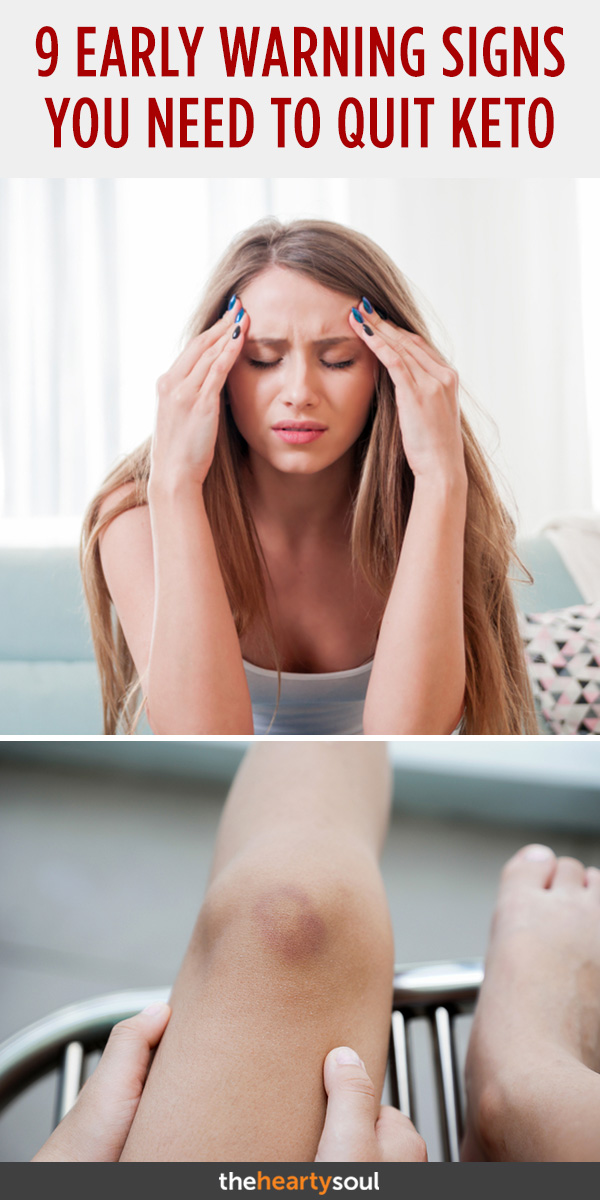
Read More: The Real Truth About The 5 Most Popular Diets In America That No One Will Tell You
Sources
- https://www.ncbi.nlm.nih.gov/pubmed/12679447
- https://www.ncbi.nlm.nih.gov/pubmed/19049574
- https://www.ncbi.nlm.nih.gov/pmc/articles/PMC4215472/
- https://www.ncbi.nlm.nih.gov/pmc/articles/PMC3945587/
- https://www.perfectketo.com/keto-headache/
- https://www.frontiersin.org/articles/10.3389/fpsyt.2017.00043/full
- https://www.livestrong.com/article/178442-medications-that-treat-adhd-anxiety/
- https://www.healthline.com/nutrition/low-carb-and-womens-hormones#section3
- https://www.ncbi.nlm.nih.gov/pubmed/11198302
- https://www.health.harvard.edu/blog/ketogenic-diet-is-the-ultimate-low-carb-diet-good-for-you-2017072712089
- https://www.ncbi.nlm.nih.gov/pmc/articles/PMC2852806/
